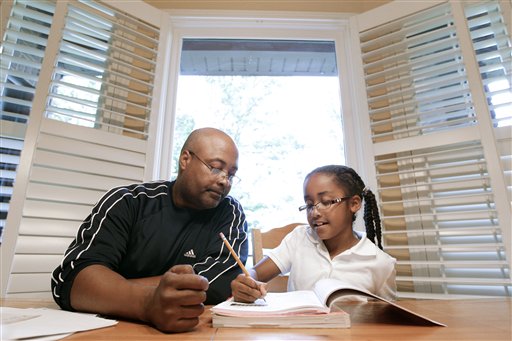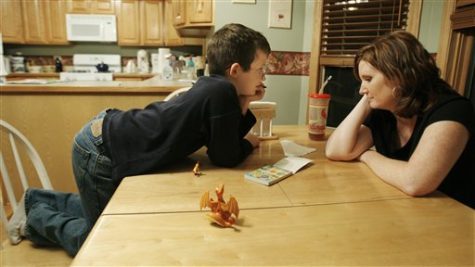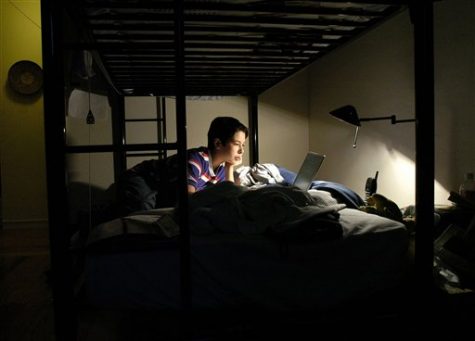Home is Homework

Roger Witherspoon helps his daughter, Gabrielle, 9, with her homework in Nashville, Tenn. Tennessee is one of only a few states that has passed laws creating evaluations or contracts that put helping with homework or attending teacher conferences into writing. (AP Photo/Mark Humphrey)
My weekday consists of an anarchic cycle of rushed mornings, before-school activities, school, after-school activities, homework, then back to bed. Balancing studies with extracurriculars is thought of as significant, but there’s another undermining challenge for students: maintaining family relationships.
An “ideal” student is one involved in a variety of activities, in addition to classes, as emphasized by a majority of schools. Jeff Brenzel, Dean of Undergraduate Admissions at Yale University, has said the most important thing in a college application is a student’s high school transcript. Plus, the College Board has stated that college administrators will look at extracurriculars to get a sense of who the student is. So, the pressure is on.
However, this pressure to excel not only affects students, but it extends into personal life, affecting time spent with family. Activities can extend well past the end of the school day and into the night, and as a result, family time can easily be compromised.
Family meals are often a time to wind down over a meal, but during the school year, the number of meals a family has together is limited.

Even Apple Valley High School’s principal experiences it first hand. Mr. Bolsoni said, “[We eat together about] 3 times a week; swim season and other co-curriculars sometimes get it in the way, but we try to eat together. [In the summer it’s] about 4 times a week.
“If we don’t have meals together it’s because I’m busy with meetings or activities or someone in my family is … We want our kids to take advantage of the opportunities they have and a lot of these activities are after school and through the evening.”
According to The National Center on Addiction and Substance Abuse, teens in families that have regular sit-down dinners can have up to 4 times lower risk for cigarette, alcohol, and drug use.
Generally, family meals are important environments for families to discuss events of the day and be more involved in everyone’s lives. The National Center for Biotechnology Information has stated higher parental involvement correlates with less behavior issues, violence, and conduct issues. For Apple Valley students, parental involvement in school can usually benefit a family relationship.
Sophomore Amanda is involved in band, choir, and theatre, so she experiences the effects of the importance of time management first hand: “I think [school involvement] definitely [influences family relationships] because sometimes the activities you do can bring you together [but] sometimes it can bring you apart because you’re spending so much time apart.”
Student Shanele, who has a family dinner every night, says, “My family is super involved in my school work and what’s going on in my school life.”
Simply said – time spent at school comes at the cost of sacrificing time at home. The amount of time a family spends with each other may or may not affect how close its members are.
Does a successful studentship come at the cost of a healthy family relationship? In Eric Reimers’s case, yes – to an extent. Student Eric Reimer says, “I feel that school [is] an occasional interruption … nothing drastic,” and considers himself “a pretty average student.”
However, for student Serena, the answer is obvious and she has stated, “[Family relationships] 100% get worse [as school starts.]”
Some families’ relationships are barely affected during the school year, generally staying the same as they were in the summer. Shanale has stated, “My relationship with my family tends to stay the same. Although during the summer I spend a little more time with them.”
For others, schoolwork does limit family time, but it isn’t a negative. If anything, less interaction can be a constant reminder to be grateful. In sophomore Grace’s experience, “We cherish the time we have together more.”

My own experience, like many others, is a daily battle of commitment to school work or fun time with family. The time I spend with my own family has dramatically dropped since the beginning the school year, and although my relationship with my family hasn’t worsened contrasted to the summer, it definitely hasn’t benefited from seeing my family for usually less than a couple hours a day.
I wouldn’t be surprised if those who have schedules similar to mine do so at the sacrifice of family relationships. On top of having a family with a just as busy schedule, school work wins.







